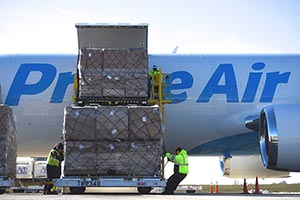Pennsylvania Airport Treading Deeper Into E-Commerce Cargo

In Pennsylvania, the Lehigh-Northampton Airport Authority took a step to grow its burgeoning e-commerce business by approving plans Jan. 31 to use a second warehouse near the airfield to handle cargo from FedEx and Amazon flights until it can build a $20 million warehouse.
The authority approved a road easement that will give developer PennCap Properties of Bethlehem clear access between the airport's air cargo ramp to a second warehouse where goods flown in by FedEx and Amazon can be sorted before being delivered to consumers across the Northeast.
FedEx Corp. ranks No. 2 on the Transport Topics Top 100 list of the largest U.S. and Canadian for-hire carriers.
The move is billed as a stopgap measure to allow Lehigh Valley International Airport to accommodate a growing number of air cargo flights, as it makes plans to build a 50,000-square-foot warehouse on the airfield, authority Executive Director Charles Everett Jr. said.
RELATED: Amazon establishes air cargo hub in Kentucky
That new warehouse still hasn't been approved by the authority, but if the airport's plans to make millions of dollars a year in the air cargo business are to happen, it's not a matter of if but when to invest $20 million to build it, Everett said.
"If we don't build soon, our time in the air cargo business will be short-lived," Everett said. "The market is expanding and if we don't do something temporary, we'll lose those customers before we have a chance to build."
Though the airport's primary purpose is serving the estimated 700,000 passengers who fly out of LVIA each year, authority board members believe growing its air cargo business could be the key to the airport's financial future, ultimately allowing it to better serve those passengers.
RELATED: Amazon boosts cargo shipments 166% at Pennsylvania airport
FedEx has been making two flights of consumer goods into LVIA daily for years, but the airport's fortunes began to change in 2015 when Amazon.com first rolled out its secret pilot project — code name Aerosmith — using Wilmington, Ohio-based Air Transport International planes to shuttle packages around the country.
Amazon used five airports, including LVIA, to cut delivery time and take control of a supply chain that had left some customers disappointed when third-party companies didn't deliver packages by Christmas. That project has since gone public, and LVIA is a key spoke in Amazon's new air cargo wheel.
And, unlike FedEx, which uses its employees to handle the flights and goods, Amazon is paying the authority to provide ground crews, package handling and maintenance services, on top of the landing fees and fuel purchases it makes at LVIA. With e-commerce burgeoning and the Lehigh Valley taking its place among the fastest-growing regions for warehousing, goods into the airport have been increasing almost by the month. What started as two Amazon flights a day now is five, and that could grow, particularly during the Christmas season.
Amazon's arrival has already created 65 full-time jobs at the airport and has the potential to net the authority several million dollars a year.
The problem is that it has grown so fast the airport is nearly out of space. The five slots on its air cargo ramp are sometimes filled with FedEx planes and planes from the three airlines serving Amazon. And a 25,000-square-foot warehouse, just off the airfield, used to stage cargo before loading it on trucks, is at capacity, Everett said.
The ultimate fix is a $20 million warehouse on the airfield, likely owned by the authority, where the operation would have room to grow. But that could be two years away, Everett said.
"This will keep Amazon happy, and it's a marvelous way for us to keep things growing while we work on a more permanent solution," authority Chairman J. Michael Dowd said.
The move Jan. 31 paved the way for PennCap Properties to lease a 20,000-square-foot warehouse it owns on Postal Road to airlines serving Amazon —ABX Air, Air Transport Services and Atlas Air. It gives PennCap a road easement that will enable cargo crews to move goods between the air cargo ramp and the warehouse. With the easement in hand, PennCap can begin building the road immediately.
The authority isn't part of PennCap's deal to lease a warehouse for Amazon goods, but the two companies needed access across airport property. In the end, it allows the authority to charge more landing fees and sell more jet fuel to FedEx and Amazon.
"We know our future is in air cargo," Dowd said. "This is going to help us get there."

